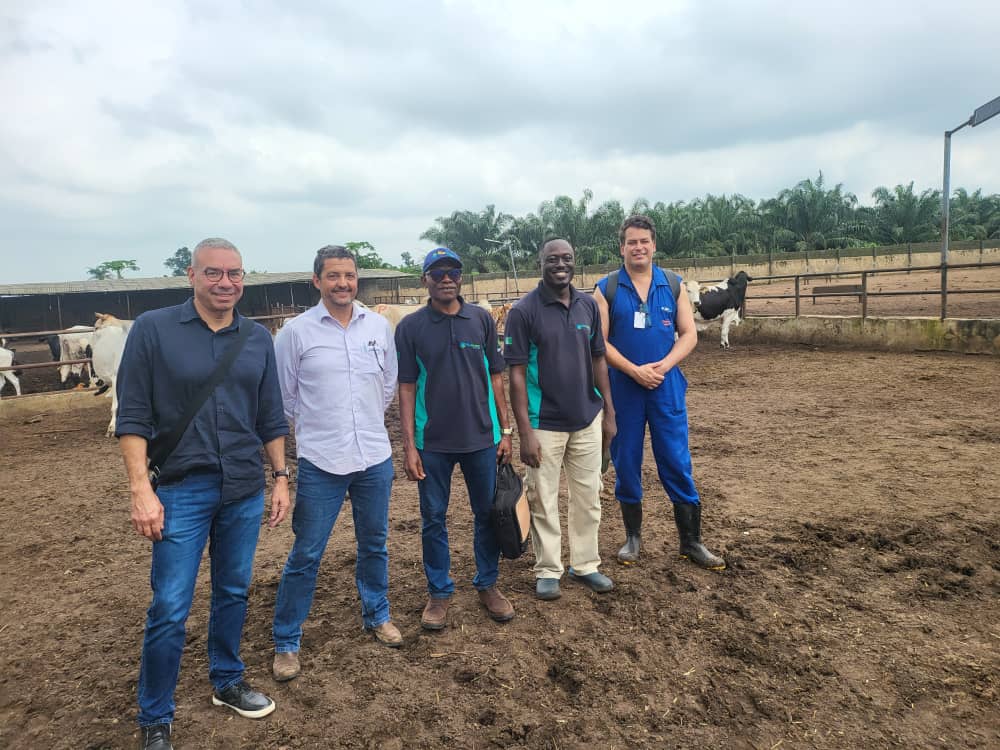The Agricultural Attaché to the Brazilian Embassy in Nigeria, Mr. Frederique Rosa E Abreu, has commended the positive laboratory results of Nigeria’s first-ever cattle embryo transfer, describing it as a major milestone for the country’s livestock industry.
Speaking to journalists in Lagos on Tuesday, Abreu said the breakthrough will significantly enhance food security by accelerating dairy production.
“This achievement is a testament to the power of international cooperation, uniting both public and private sectors in pursuit of sustainable livestock improvement,” he stated.
Abreu highlighted that technical teams and public officials from the Ministries of Agriculture and Livestock in both countries collaborated to achieve mutual understanding, which led to the approval of the international certification.
He also noted that the involvement of the private sector — especially the partnership between Brazilian biotechnology firms and Nigerian agricultural companies — played a critical role in the success of the project.
He praised the leadership of Nigeria’s Minister of Livestock Development, Alhaji Idi Mukhtar Maiha, for his commitment to modernizing the sector.
“With this development, there will be a major boost in livestock production. For example, the average milk yield per cow in Nigeria is just about three litres, and there’s room for vast improvement. This is the first step in restarting a new dairy industry in Nigeria,” Abreu added.
Mr. Humberto Da Rosa, International Business Director of Zebuembryo — the technical partner to Silagreen International Agro Development Ltd. — described the feat as a significant milestone.
“We conducted gestation diagnoses for the first Nigerian cows that received embryos from Brazil. This took place at Harmony Farms in Ogun State, and we achieved good results,” Da Rosa said.
He explained that the embryos came from the Girolando breed, a crossbreed between Holstein and Gir cattle known for its resilience to parasites, heat, and humidity, as well as high milk yield.
Da Rosa urged Nigerian farmers to embrace the new technology, noting that the environmental conditions and challenges in Nigeria are similar to those in Brazil.
“We believe this is a shortcut to improved productivity using Brazilian breeds and genetics,” he stated.
Michael Akinruli, CEO of Silagreen International Agro Development Ltd., described the embryo transfer as a landmark achievement and a valuable learning opportunity for Nigerian farmers.
“This is the first time we are laying a foundation for purebred dairy and beef animals in Nigeria. It aligns with the federal government’s efforts to improve beef and milk production,” he said.
He added that the initiative enables farmers to raise animals with consistent global records of milk and beef production, thereby aligning Nigeria’s livestock industry with international standards.
Chairman of Silagreen Agro, Engr. Dr. Amos Ayodele, also expressed excitement over the successful outcome of the procedure, which he said validates the company’s vision to revolutionize cattle production in Nigeria.
“This is the first of its kind in Nigeria. Initially, many were skeptical, but six courageous farmers embraced the idea. Today, we are all celebrating the success,” he said.
He identified participating farms as Kosbaz Farm (Ilorin), Adila Farm, Harmony Farm, and Bluerich Farm (Ogun State), as well as Divine Living and Eagle Crest Farms (Oyo State).
Ayodele explained that the technology involves identifying top-performing donor animals and transferring their embryos to Nigerian cows. The resulting calves, expected in about six months, will determine the future of Nigeria’s livestock sector.
“We’re already seeing increased interest from other farmers who were waiting to confirm the success before joining. With this breakthrough, we expect an influx of requests for embryo transfers,” he said.
He assured that all necessary regulatory protocols were followed, with approvals secured from the Federal Ministry of Livestock and other relevant authorities.
“This initiative has the full backing of the federal government, and we are confident that this success will encourage wider adoption of the technology across the country,” Ayodele said.
He further affirmed that Nigerian farmers are not only informed about the innovation but are also eager to adopt it, now that its viability has been proven.















